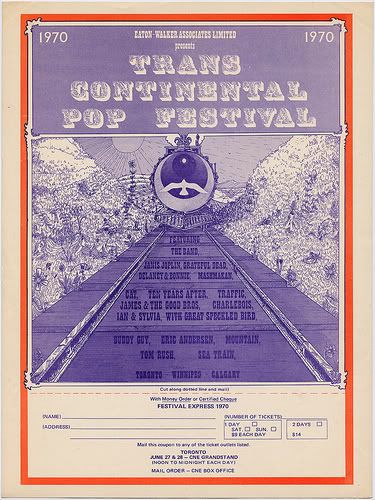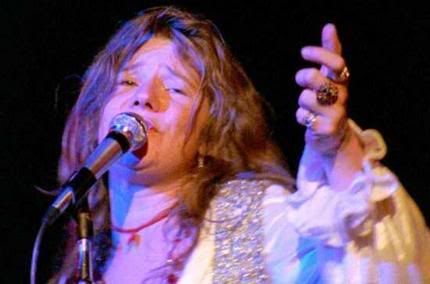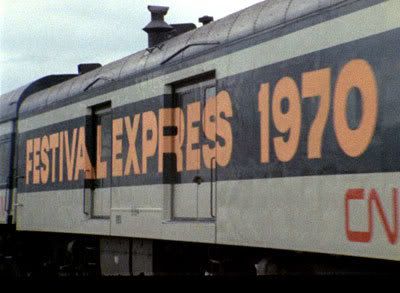
There they are again, the musical luminaries of my youth, in the film Festival Express, which I watched on DVD the other night. The Grateful Dead, Janis Joplin, The Band, Buddy Guy, lots of others, playing concerts in Toronto, Winnipeg, and Calgary, with scenes shot aboard the train that carried them across the plains of Canada between gigs. (It may have been the last time in history that a band tour traveled by railroad.)
That was in July 1970, the zenith of the time we call generically the Sixties, which was actually 1967 to 1971. It looked very familiar to me. I wasn't at any of these concerts — I was a Berkeley freak at the time — but it reminded me of the Zeitgeist I'd once been so much a part of.
Let's see, summer 1970 was almost 39 years ago. Incredible. Some of you reading this weren't even born then. Whether you're old enough to remember the time or not, Festival Express isn't a bad way to immerse yourself in its vibe.
Many people today think the '60s were when it all started to come apart, a social revolution that became a social devolution eventually leading to today's reflexive political correctness, the Waterloo for civilized values. On the whole, I agree, notwithstanding my being among that generation.
But some of what went down was positive. There was the music, and … well, to try to explain what else was inspirational is probably futile if you weren't part of it. (And believe me, I'm not talking about the politics, which is what did most to corrupt the Sixties.) Yes, the music.
Festival Express was shot on 16 mm film, so the picture is a little grainy, not enough to be seriously annoying. The sound recording is remarkably good for live, outdoor venues, though, especially with the high-wind factor you can see in some shots. The you-are-there quality of the musical performances satisfies.
Dead heads will of course want to see the movie … no, undoubtedly already have seen it. This incarnation was more or less the original band, including Ron "Pigpen" McKernan. I don't think they're at their best in these performances; they're merely terrific. Ditto for The Band — the mystique of their early albums is missing. They were probably more a recording ensemble than a performing one.
Buddy Guy, the great electric blues guitarist, burns the screen up in his solos on "Money" and "Hoochie Coochie Man." The wonderful Ian & Sylvia contribute a couple of numbers. Tom Rush, from the early-'60s generation of modern folk singers, reminds us how splendid he was (is?). It's fun to see and hear the Flying Burrito Brothers again. (If you rent the DVD, be sure to watch the outtakes included as extras. They contain as much quality music as that in the theatrical release.)
And … Janis. I suppose it's possible, if you know Janis Joplin only from her albums, to wonder what all the fuss was about. Well, this is what. She's backed by her later band, Full-Tilt Boogie, much superior to the original Holding Company. Despite her well-publicized dysfunctional off-stage behavior — and the film shows her, at one of the many impromptu jam sessions on the train, blissed out with God knows what combination of extraneous chemicals bubbling in her brain — she was a serious musical artist. There is discipline amid the performance fireworks. Her songs captured here should be preserved for the wonder of future viewers.
Younger viewers will find the "hippie" looks of the audience a hoot. Having lived through the period, the sight isn't bizarre to me, but even I have to admit that a lot of the guys with their Geronimo hair, droopy mustaches, clown trousers, and love beads are dead goofy. Women, on the other hand, know how to make the most of their assets in any fashion environment. The gypsy-ish "chicks" still strike me as appealing. (And I enjoy seeing that young women today have revived the long, straight hairstyles.)
Before you decide I am wallowing in nostalgia, I note that there are aspects of Festival Express that show those days in a less admirable light. Even some of the music. The road show includes a Canadian band called Mashmakan, which I had never before heard or heard of, and hope never to again. Seatrain does a pretentious "art rock" number. But worse, and casting an ominous shadow before it, is the behavior of some of the fans.
They were outraged that they were expected to buy concert tickets. It's the people's music! It should be free, man! Never mind that the producer had to pay the bands and hire an entire train from Canadian National Railways. (He wound up taking a bath on the enterprise.) As happened so often in the days of peace and love, the anti-capitalist mood turned ugly. Police and guards hired for crowd control became targets; one policeman, we are told, received a serious head wound. To his credit, Bob Weir of the Dead is shown arguing with a militant against such thuggery.
When gate crashers threatened to create chaos, Jerry Garcia asked the crowd outside for a little time to sort the situation out. He then arranged a free Dead concert at a nearby park. That moment symbolizes what went wrong in the '60s. Jerry and his group should have used their popularity and perceived moral authority to teach the rebel children the basics of responsibility. Instead, the louts who demanded something for nothing were appeased and legitimized.
Musical, sociological, and historical interest aside, Festival Express isn't much of a movie. The recent interviews with the producer and some of the musicians are as dull as such things usually are. The director, Bob Smeaton, is a big fan of that irritating device, the split screen.
It's sad, and a little strange, to reflect on the passing of some of the people in Festival Express shown making music of such vitality. They seem so present, so "real," thanks to the ability of film to preserve the past. Jerry; "Pigpen"; Janis, who died three months after the film was shot. Delaney, of Delaney & Bonnie and Friends, who was also among the musicians on the tour, died while I was in London last December. The Telegraph had an obit of a few paragraphs for him.
Simon Gray, in his next-to-last memoir The Year of the Jouncer, writes about visiting his friend Alan Bates (the actor) in a hospital during Bates's last days. Around the same time, while channel surfing, he caught glimpses of Bates in old movies, young again, "in a bowler hat, an eyebrow raised, smiling quizzically."
Gray muses on "the contradiction that never existed before the invention of movies, of people who are long dead being visibly alive, you can see them breathe, there they are, the characters and the actors, both with futures of life and death unknown to them in the two stories they're in."
It occurs to me that the flower children grooving in those 1970 concerts are in their 50s and 60s now. Not a few have since then succumbed to illness or accident. While I believe that we survive the change called death, it would hardly be human not to feel a little knot tighten somewhere inside while thinking about those who are no longer with us.
If I were in a gloomy mood, which thankfully I'm not, I might echo the words of the 10th century Syrian poet Abu’l-Ala al-Ma‘rri (R.A. Nicholson, translator):
That was in July 1970, the zenith of the time we call generically the Sixties, which was actually 1967 to 1971. It looked very familiar to me. I wasn't at any of these concerts — I was a Berkeley freak at the time — but it reminded me of the Zeitgeist I'd once been so much a part of.
Let's see, summer 1970 was almost 39 years ago. Incredible. Some of you reading this weren't even born then. Whether you're old enough to remember the time or not, Festival Express isn't a bad way to immerse yourself in its vibe.
Many people today think the '60s were when it all started to come apart, a social revolution that became a social devolution eventually leading to today's reflexive political correctness, the Waterloo for civilized values. On the whole, I agree, notwithstanding my being among that generation.
But some of what went down was positive. There was the music, and … well, to try to explain what else was inspirational is probably futile if you weren't part of it. (And believe me, I'm not talking about the politics, which is what did most to corrupt the Sixties.) Yes, the music.
Festival Express was shot on 16 mm film, so the picture is a little grainy, not enough to be seriously annoying. The sound recording is remarkably good for live, outdoor venues, though, especially with the high-wind factor you can see in some shots. The you-are-there quality of the musical performances satisfies.
Dead heads will of course want to see the movie … no, undoubtedly already have seen it. This incarnation was more or less the original band, including Ron "Pigpen" McKernan. I don't think they're at their best in these performances; they're merely terrific. Ditto for The Band — the mystique of their early albums is missing. They were probably more a recording ensemble than a performing one.
Buddy Guy, the great electric blues guitarist, burns the screen up in his solos on "Money" and "Hoochie Coochie Man." The wonderful Ian & Sylvia contribute a couple of numbers. Tom Rush, from the early-'60s generation of modern folk singers, reminds us how splendid he was (is?). It's fun to see and hear the Flying Burrito Brothers again. (If you rent the DVD, be sure to watch the outtakes included as extras. They contain as much quality music as that in the theatrical release.)
And … Janis. I suppose it's possible, if you know Janis Joplin only from her albums, to wonder what all the fuss was about. Well, this is what. She's backed by her later band, Full-Tilt Boogie, much superior to the original Holding Company. Despite her well-publicized dysfunctional off-stage behavior — and the film shows her, at one of the many impromptu jam sessions on the train, blissed out with God knows what combination of extraneous chemicals bubbling in her brain — she was a serious musical artist. There is discipline amid the performance fireworks. Her songs captured here should be preserved for the wonder of future viewers.
Younger viewers will find the "hippie" looks of the audience a hoot. Having lived through the period, the sight isn't bizarre to me, but even I have to admit that a lot of the guys with their Geronimo hair, droopy mustaches, clown trousers, and love beads are dead goofy. Women, on the other hand, know how to make the most of their assets in any fashion environment. The gypsy-ish "chicks" still strike me as appealing. (And I enjoy seeing that young women today have revived the long, straight hairstyles.)
Before you decide I am wallowing in nostalgia, I note that there are aspects of Festival Express that show those days in a less admirable light. Even some of the music. The road show includes a Canadian band called Mashmakan, which I had never before heard or heard of, and hope never to again. Seatrain does a pretentious "art rock" number. But worse, and casting an ominous shadow before it, is the behavior of some of the fans.
They were outraged that they were expected to buy concert tickets. It's the people's music! It should be free, man! Never mind that the producer had to pay the bands and hire an entire train from Canadian National Railways. (He wound up taking a bath on the enterprise.) As happened so often in the days of peace and love, the anti-capitalist mood turned ugly. Police and guards hired for crowd control became targets; one policeman, we are told, received a serious head wound. To his credit, Bob Weir of the Dead is shown arguing with a militant against such thuggery.
When gate crashers threatened to create chaos, Jerry Garcia asked the crowd outside for a little time to sort the situation out. He then arranged a free Dead concert at a nearby park. That moment symbolizes what went wrong in the '60s. Jerry and his group should have used their popularity and perceived moral authority to teach the rebel children the basics of responsibility. Instead, the louts who demanded something for nothing were appeased and legitimized.
Musical, sociological, and historical interest aside, Festival Express isn't much of a movie. The recent interviews with the producer and some of the musicians are as dull as such things usually are. The director, Bob Smeaton, is a big fan of that irritating device, the split screen.
It's sad, and a little strange, to reflect on the passing of some of the people in Festival Express shown making music of such vitality. They seem so present, so "real," thanks to the ability of film to preserve the past. Jerry; "Pigpen"; Janis, who died three months after the film was shot. Delaney, of Delaney & Bonnie and Friends, who was also among the musicians on the tour, died while I was in London last December. The Telegraph had an obit of a few paragraphs for him.
Simon Gray, in his next-to-last memoir The Year of the Jouncer, writes about visiting his friend Alan Bates (the actor) in a hospital during Bates's last days. Around the same time, while channel surfing, he caught glimpses of Bates in old movies, young again, "in a bowler hat, an eyebrow raised, smiling quizzically."
Gray muses on "the contradiction that never existed before the invention of movies, of people who are long dead being visibly alive, you can see them breathe, there they are, the characters and the actors, both with futures of life and death unknown to them in the two stories they're in."
It occurs to me that the flower children grooving in those 1970 concerts are in their 50s and 60s now. Not a few have since then succumbed to illness or accident. While I believe that we survive the change called death, it would hardly be human not to feel a little knot tighten somewhere inside while thinking about those who are no longer with us.
If I were in a gloomy mood, which thankfully I'm not, I might echo the words of the 10th century Syrian poet Abu’l-Ala al-Ma‘rri (R.A. Nicholson, translator):
Life is a malady whose one medicine is death. …
All come to die, alike householder and wanderer.
The earth seeketh, even as we, its livelihood day by day
Apportioned; it eats and drinks of human flesh and blood. …
Meseemeth the crescent moon, that shines in the firmament
Is death’s curved spear, its point well sharpened,
And splendor of breaking day a sabre unsheathed by the Dawn.
All come to die, alike householder and wanderer.
The earth seeketh, even as we, its livelihood day by day
Apportioned; it eats and drinks of human flesh and blood. …
Meseemeth the crescent moon, that shines in the firmament
Is death’s curved spear, its point well sharpened,
And splendor of breaking day a sabre unsheathed by the Dawn.




3 comments:
Thanks for mentioning Delaney in your blog.
Steve Fischler
Promotions Director
Magnolia Gold Records
Home of the Legendary Delaney Bramlett
Steve,
I used to have the pre-CD black disc of Delaney & Bonnie and Friends on tour with Eric Clapton. That was cracking good stuff.
So long ago, now.
I've seen this movie. A great document of the times. And Janis has such emotional intensity - I actually started crying when she hit the first note of one of her songs.
Post a Comment